#シン・スウ・リン
Text
過去絵
ショーターとシンが好き




2 notes
·
View notes
Text

あけましておめでとう〜!!!
#banana fish fanart#bananafish#banana fish#ash x eiji#asheiji#ash lynx#eiji okumura#okumura eiji#shorter wong#sing soo ling#アッシュ・リンクス#奥村英二#ショーターウォン#シン・スウ・リン#バナナフィッシュ
82 notes
·
View notes
Photo




banana fish band au
#banana fish#バナナフィッシュ#ショーター・ウォン#アッシュリンクス#シン・スウ・リン#奥村英二#銀杏boyz#ging nang boyz#eiji okumura#ash lynx#soo ling sing#sing soo ling#shorter wong#banana fish fanart
509 notes
·
View notes
Text
On Sing’s name
Previously, I’ve discussed Chinese names in BF in general but this time I want to focus on Sing alone. My goal is to unify his original katakana name, the meanings given in GoL, the story’s setting, and his English-localized name as much as possible. I will also touch on the Taiwanese Mandarin localization, although I’m unable to tie it in neatly with the rest.
Long post ahead!
---------
So, what’s the deal with Sing’s name? Generally, there are 4 things to consider:
1) His name in the source material
シン・スウ・リン
Kunrei-shiki romanization: sin suu rin
Hepburn romanization: shin suu rin
In brief, Kunrei-shiki is said to be more representative of Japanese grammar and more intuitive for native speakers, while Hepburn is more representative of pronunciation and more intuitive for foreigners (usually English speakers).
2) The meaning of his name
There were 3 given in GoL: 魔神, 獅子 and 罪.
The English localization translated them as demon, lion and sin, respectively.
3) The localizations
English (ENG) : Sing Soo-Ling
Taiwanese Mandarin (TW): 辛舒霖 (Pinyin: xīn shūlín)
4) The setting
Manhattan’s Chinatown was Cantonese-dominated up until the 90s, while the majority of Mandarin speakers (prior to the arrival of Fuzhou immigrants in the 80s) were concentrated in Flushing instead. Based on the story, we know that Manhattan is Sing’s base of operations if not also where he lives.
Sing speaking perfectly fluent English (in contrast with Eiji who’s had his lousy English pointed out several times) also suggests that even if his parents were new immigrants, he should have been in the country during his formative years to familiarize with the language. There’s nothing to suggest that his family was first gen though, besides him and Lao not having English names like Shorter which hints that they might not have “assimilated” yet. And looking at the timing of his birth (+/- 1971), the likelihood of Sing being from a Mandarin-speaking family drops even further.
Him being a native Cantonese speaker would be consistent with his ENG-localized surname, but not his given name. Suu is not a sound that exists in Cantonese. It begs the question of why the ENG localization did not change it to suk or syu the same way they localized Yut-Lung’s attendant’s name (suuruu) into “Suk-Leui.” Even “Yau-Si” is quite a departure from yuushisu and they’ve modified other names as well, so it makes you wonder why suu rin was exempted from this.
The meanings given in GoL also do not seem to connect with any of his localized names. All in all, contradictions abound!
---------
So...
Here’s my grand unification theory:
Sing’s given name is NOT meant to be shu lin but si/shi ling in Mandarin Pinyin.
スウ・リン (suu rin) is just a Japanese approximation of those sounds. Note that sh can sound VERY similar to s in certain Mandarin accents, so it's understandable how the Japanese suu ended up as shu in the TW localization. But it would make more sense for the Japanese to follow Standard Mandarin pronunciation, and we can actually see this in the manga itself: the furigana given for 說 (shuō) was シュオ (shuo), utilising the shu (シュ) sound that exists natively in Japanese. Therefore, suu (スウ) should NOT result in the Mandarin shu; it should either be the Mandarin su or a transliteration of the Mandarin si/shi [pronunciation here] which has no direct equivalent in Japanese.
But whichever it is, Mandarin is not very suitable when taking setting into consideration. I propose that his name should sound similar to suu rin in his mother tongue dialect (not Mandarin) with a definite s sound so that its approximate English romanization can be “Soo-Ling.”
Sing’s surname should be pronounced sin in his mother tongue (similarly with s and ending with n instead of ng).
In short, his given name should be read as si/shi ling in Mandarin, but his entire name should sound like sin su lin(g) in his mother tongue dialect, although for whatever reason, it ended up romanized as Sing Soo-Ling.
And the mother tongue that I want to propose for him is Hakka!
Why? Mainly because it ties in with TWO meanings given in GoL:
1. Lion (獅子)
獅 is pronounced shī in Mandarin and su in Hakka. Also, there is a town in Guangzhou called 獅嶺 (Pinyin: shī lǐng; Hakka: su liang; lit. “lion ridge”). Apparently “the district is mostly Hakka speaking, and is the ancestral home of many Overseas Chinese of Hakka descent” which makes it a nice coincidence.
Plus, seeing as Sing is meant to parallel Ash to a certain extent, “lion” being in his given name makes a great shoutout to the actual meaning for Aslan.
2. Sin (罪):
Both the TW-localized surname and the one I will suggest later are pronounced sin in Hakka. Having his surname ACTUALLY be pronounced similarly to the English word “sin” means there’s no need to awkwardly invoke Kunrei-shiki, AND it gives the scene in GoL more gravity for being authentic.
The third meaning is still problematic though. I have a half-baked guess:
3. Demon (魔神)
蜃 (Pinyin: shèn) - “In Chinese mythology, it is a shapeshifting dragon or shellfish-type sea monster believed to create mirages.” In Japanese, it is the shin in shinkirou (蜃気楼; “mirage”). Sounds close to his surname, I guess?
It isn’t inherently demonic like what 魔神 implies, so it’s still off the mark. Taking a look at the word 魔神 itself:
魔神 (Pinyin: mó shén) - lit: demon god. 神 can be read as sin in Southern Min dialects and Hakka. Doesn’t explain where the 魔 comes from though. 神 on its own just means “deity.“ That said, there is folklore in Taiwan surrounding creatures called mo sin a (魔神仔; “little devils”), so maaaaaaaybe this could work if you squint?
---------
Name Suggestions
Anyway, moving on to possible Chinese characters for Sing’s name.
Warning: Entering wild speculation zone!
Below is a summary of the official TW localization and my own suggestions in a few dialects (obviously non-exhaustive). I’ve also highlighted the ones that could match the ENG-localized spelling.
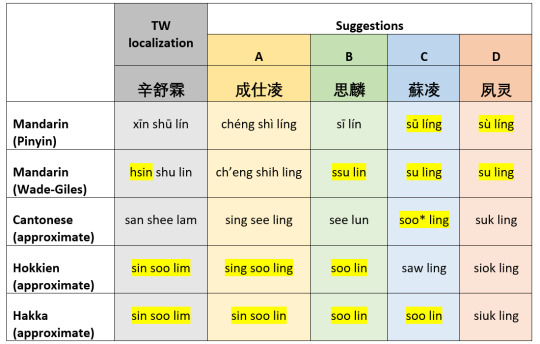
(Will not be commenting on their meanings to keep this short. If you’re curious, feel free to stick them into an online dictionary: 辛舒霖, 成仕凌, 思麟, 蘇凌, 夙灵)
Note 1: I tried to avoid characters that are commonly “feminine” or returned only women in search results (like 素 and 玲). But looking at how many women there were overall, I’m convinced that this name would work better if he were AFAB. 😅
Note 2: TBH there is nothing much going for Option D, I just like the look of it. Lol. This only works for Mandarin and it’s in simplified characters instead of traditional, which are both minuses setting-wise. Maybe it could work for the anime universe?
Note 3: The Cantonese soo* in Option C is pronounced like the English “so.” I’d wager that people would spell it like soo/sou to emphasize the long vowel sound. Don’t know if it makes a proper name though. Another candidate for Cantonese could be 小 (like a distorted soo?), but I think most people would know to romanize it as siu/siew.
Note 4: All soo’s for Hokkien and Hakka here are either pronounced like the sou in the English “soup” or the ss in “hiss” (not exactly but kinda).
Note 5: Option B is the name of a real guy I found, and is actually romanized as Soo Ling! As I’ve mentioned earlier, shi & si can sound very similar in some Mandarin accents and n & ng are also easily confusable, so this name could somewhat work as a callback to “lion ridge”... but the characters seem a little too fancy for Sing IMO......
Also I couldn’t find many names with the lion (獅) character, so I’m thinking it makes a tacky name and ended up picking homophone characters. And thus, Option A was born. No idea if it’s a good name though. 😅
...On second thought, it’s a fictional story, so maybe it’s perfectly fine for Sing to have a tacky “lion” name. 🤷
(Edit: forgot to include this in the table - 獅 (lion) is shi in Mandarin, see in Cantonese, sai in Hokkien/Southern Min and su in Hakka.)
Note 6: Pinyin is provided for comparison but it’s not very suitable for the setting.
Note 7: Wade-Giles is provided for the possibility of the name being Mandarin, as its spelling would likely be closer to that. That said, spelling variations are still very possible. A real-life example: Taiwanese-American singer Wang Leehom (王力宏; Wade-Giles: wang li-hung; Pinyin: wang lihong).
Note 8: Approximate spellings are used for non-Mandarin dialects instead of standardized romanization (ie. Jyutping, POJ) because the assumption is that his name would have been romanized based on spoken language alone. They are based on my personal judgment after looking through a whole bunch of names (mostly of diaspora Chinese).
Anecdotally speaking, variations seem to be quite common. Eg: 林 as lim and ling, 安 as an and ang, 龍 as lung, loon, loong... and so on. Note that this is after comparing only names from the same dialect (not with perfect controls but ✰ I Tried ✰).
I believe this makes for a strong argument that Sing’s name falls under similar circumstances, which is why I am not aiming for an exact match with the ENG-localized spelling, although I do try to get something with enough wiggle room.
If I were to prioritize faithfulness to both localizations though, I would say that adopting a Hokkien/Southern Min reading for the TW-localized name would be the best.
HOWEVER… I have to point out that they’ve also localized Shorter’s surname as 翁 (Pinyin: weng). That surname cannot be read as wong in Cantonese (it’s yung). Perhaps they thought 翁 sounded more faithful to the original Japanese or suited to Hokkien (ong), or perhaps there is some other reason. Setting-wise though, I believe the Cantonese wong (王/黄) would be the better fit. This is why I am skeptical of the TW-localized names and am offering up my own (admittedly dubious) ones.
Note 9: Regarding surname choice – as I am pushing for a Hakka reading, I picked 成 (in Option A) because that’s the only シン sounding surname I could confirm as belonging to an actual Hakka person (although it seems to be more commonly romanized as Shing in Hong Kong, despite being pronounced like sing/seng).
辛 could be the better choice depending on dialect, as I’ve also found these romanizations:

(辛 (Sing) can also be a Teochew surname. For Cantonese, the 冼 (Sin) surname is another option, although it’s pronounced more like “seen.”)
Whatever it is though, シン is ambiguous enough to have plenty leeway in interpretation. シ can be read as either si- or shi- while ン can be read as -n or -ng. Even -m wouldn’t be too far-fetched, IMO.
Personally, I’m keen on the “romanized as Sing but actually pronounced as sin” argument because I don’t like relying on Japanese Kunrei-shiki to get the “sin” definition. It feels iffy for 2 reasons:
1) It is true that there are many instances of Kunrei-shiki in the source material. For example, Eiji introduces himself as “Eizi” in the first volume.

However, it is romanized as Eiji in most other official material so I think it is more consistent to follow that. Any Kunrei-shiki in the manga can be attributed to it being meant for native Japanese readers (the romaji is probably only there to provide ~foreign vibes~ anyway) or an approximation of spoken language, rather than how it’s actually spelled on paper.
Here’s another funny example:

(Yeah, that’s supposed to be “shit.”)
2) It is rare for Kunrei-shiki to be taught to foreigners learning Japanese, so it would make no sense for Sing to know it. Even if he’d somehow managed to get his hands on such material, there’s still a problem: regardless of how シン is romanized, it is actually pronounced like shin and not like sin. This is because the si sound does not exist natively in Japanese, unless you write it like スィ to mimic that sound. Even then, it would be romanized as swi in Kunrei-shiki. It just doesn’t add up from an in-universe perspective, you know?
---------
Conclusion
I don’t think there’s a perfect answer that ties up every loose end. Fact is, even the official guidebook is iffy – it romanizes his name as “Sing Su Rin” in the latest reprint, which is pretty dang chaotic.
Ultimately, it boils down to preference and what you’re willing to suspend disbelief for. Personally, I choose to prioritize ENG over TW. I’m also fond of Hakka Sing because it strikes a nice balance between everything, and because I think the sound of the language suits him! :D
#banana fish#sing soo ling#シン・スウ・リン#probs could've arranged my thoughts better but w/e 😴#anyway im open to corrections additions etc all of that is welcome#i know im bound to make a mistake somewhere bc im a big banana lol
13 notes
·
View notes
Photo

Continued single father’s AU :D
#banana fish#sing soo ling#shorter wong#fanart#baby au#singel fathers au#バナナフィッシュ#シン・スウ・リン#ショーター・ウォン
548 notes
·
View notes
Photo

[Pics]『BANANA FISH』The Stage -後編- (banana fish the stage -kouhen-)
visuals update under the cut^^
Cast:

Mizue Kenta as Ash Lynx (アッシュ・リンクス)

Okamiya Kurumu as Okumura Eiji (奥村英二)

Uchida Asahi as Max Lobo (マックス・ロボ)

Tomita Masanori as Ibe Shunichi (伊部俊一)

Shiina Taizou as Sing Soo-Ling (シン・スウ・リン)

Sana Hiroki as Lee Yut-Lung (李月龍)

Fujita Rei as Blanca (ブランカ)

Taniguchi Masashi as Eduardo L. Fox (エドアルド・L・フォックス)

Akaboshi Shouichirou as Dino F Golzine (ディノ・F・ゴルツィネ)
homepage
twitter
natalie
#banana fish#水江建太#mizue kenta#岡宮来夢#okamiya kurumu#内田朝陽#uchida asahi#冨田昌則#tomita masanori#椎名鯛造#shiina taizou#佐奈宏紀#sana hiroki#藤田玲#fujita rei#赤星昇一郎#akaboshi shouichirou#谷口賢志#taniguchi masashi
28 notes
·
View notes
Text
アニメ『BANANA FISH』新規映像などを公開 ED曲はKing Gnu
7月5日よりフジテレビ「ノイタミナ」枠ほかで放送開始されるアニメ『BANANA FISH』の各局放送時間、新規映像、追加キャスト、エンディングテーマ曲が発表された。
【動画】アニメ『BANANA FISH』CM第3弾
新たに発表されたキャストは、シン・スウ・リン役の千葉翔也、ラオ・イェン・タイ役の斉藤壮馬、チャールズ・ディキンソン役の上田燿司、アントニオ・ジェンキンズ役の小形満、スキップ役の村瀬歩。
エンディング曲は、東京藝術大学出身で独自の活動を展開するクリエイター・常田大希(Gt.Vo.)が2015年に結成した「Srv.Vinci」をはじまりに、メンバーチェンジを経て、現在は常田、勢喜遊(Drs.Sampler)、新井和輝(Ba.)、井口理(Vo.Key.)の4人で活動しているバンド「King Gnu」(17年4月に改名)による「Prayer…
View On WordPress
0 notes
Text
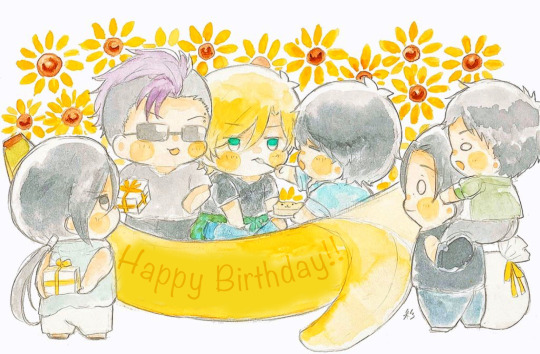
🎉🎂Happy Birthday Ash 🎂🎉
#BANANAFISH#BF#ash x eiji#ash lynx#ash#eiji okumura#okumura eiji#shorter wong#shorter#sing soo ling#lee yut lung#banana fish fanart#バナナフィッシュ#アッシュ・リンクス#アッシュリンクス#奥村英二#ショーターウォン#ショーター・ウォン#シン・スウ・リン#月龍
87 notes
·
View notes
Text
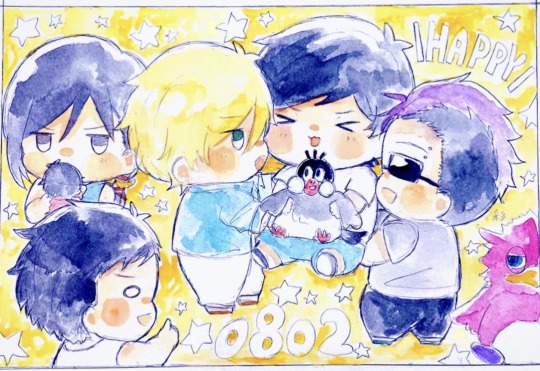
8月2日英二の日でしたね🐰💓
#banana fish fanart#bananafish#banana fish#ash x eiji#asheiji#ash lynx#ash#eiji okumura#eiji#shorter wong#shorter#sing soo ling#lee yut lung#バナナフィッシュ#アッシュ・リンクス#奥村英二#ショーター・ウォン#シン・スウ・リン#月龍
76 notes
·
View notes
Text

お花見🌸🍡🌸
If there was a what-if world, I could have spent a happy time with Eiji and the others.( ´•̥ ̫ •̥` )
#bananafish#BF#ash x eiji#ash lynx#okumura eiji#ash#eiji#BANANAFISH#banana fish#shorter wong#sing soo ling#lee yut lung#バナナフィッシュ#アッシュ・リンクス#奥村英二#ショーター・ウォン#シン・スウ・リン#月龍
56 notes
·
View notes
Text
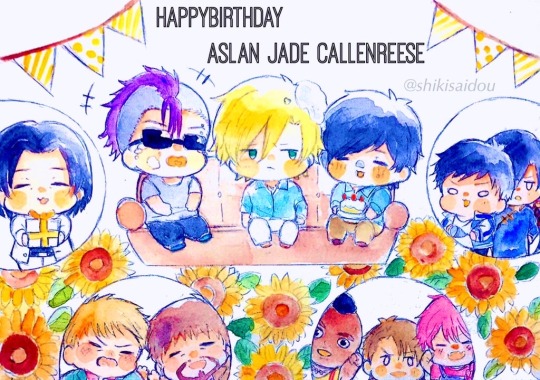
✨✨HappyBirthday✨✨✨
#bananafish#banana fish#ash x eiji#BF#ash lynx#eiji okumura#shorter wong#sing soo ling#eiji#lee yut lung#blanca#ash#shorter#アッシュ・リンクス#奥村英二#ショーター・ウォン#シン・スウ・リン#月龍#バナナフィッシュ
304 notes
·
View notes
Text
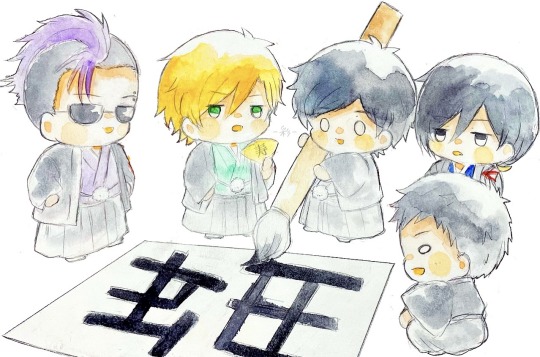
🎍今年もよろしくお願い致します〜🎍~💕
#banana fish#BF#bananafish#ash lynx#ash x eiji#ash#eiji#eiji okumura#shorter wong#sing soo ling#lee yut lung#バナナフィッシュ#アッシュ・リンクス#奥村英二#ショーター・ウォン#シン・スウ・リン#月龍
87 notes
·
View notes
Text

BANANAFISHHalloween👻🎃💕
#banana fish#bananafish#ash x eiji#ash lynx#eiji okumura#sing soo ling#shorter wong#ash#バナナフィッシュ#アッシュリンクス#奥村英二#ショーターウォン#シン・スウ・リン
87 notes
·
View notes
Text
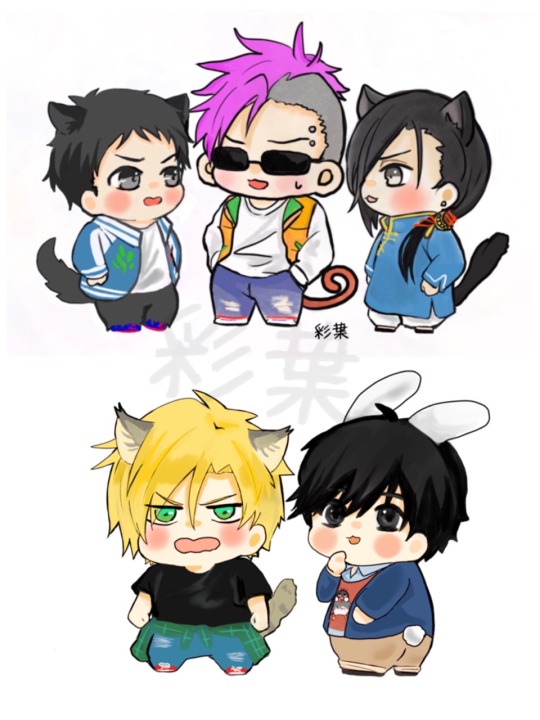
BANANAフレンズ!
#banana fish#ash lynx#eiji okumura#shorter#shorter wong#sing soo ling#lee yut lung#月龍#アッシュ・リンクス#奥村英二#ショーターウォン#シン・スウ・リン
174 notes
·
View notes
Text

くじがぁぁぁあくじがぁああ
#BANANAFISH#ash lynx#eiji okumura#shorter#sing soo ling#lee yut lung#アッシュリンクス#奥村英二#ショーター・ウォン#シン・スウ・リン#月龍
68 notes
·
View notes
Photo

[Announcement]『BANANA FISH』The Stage -後編- (banana fish the stage -kouhen-)
the show will be running from January 20th 2022 to February 6th, 2022 (Tokyo) @ 品川プリンスホテル ステラボール (Shinagawa Prince Hotel Stella Ball)
Cast:
Mizue Kenta as Ash Lynx (アッシュ・リンクス)
Okamiya Kurumu as Okumura Eiji (奥村英二)
Uchida Asahi as Max Lobo (マックス・ロボ)
Tomita Masanori as Ibe Shunichi (伊部俊一)
Shiina Taizou as Sing Soo-Ling (シン・スウ・リン)
Sana Hiroki as Lee Yut-Lung (李月龍)
Fujita Rei as Blanca (ブランカ)
Akaboshi Shouichirou as Dino F Golzine (ディノ・F・ゴルツィネ)
homepage
twitter
natalie
#banana fish#水江建太#mizue kenta#岡宮来夢#okamiya kurumu#内田��陽#uchida asahi#冨田昌則#tomita masanori#椎名鯛造#shiina taizou#佐奈宏紀#sana hiroki#藤田玲#fujita rei#赤星昇一郎#akaboshi shouichirou
25 notes
·
View notes